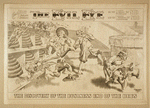The very word, "spoon" conjures up visions of pleasure. Its very presence sets the salivary glands in action. The gluttonous nature innate in all is aroused at its picture, and juicy ragouts, steaming soups and fricassees, stews and bouillabaisses pass before the vision. All love the spoon, the emblem of plenty, of fulness and content...The glass, the tankard, the loving cup, bring as much sorrow as pleasure into the world; the spoon all pleasure. The loving ladle enters into broils, the spoon does not. The statement may partake of jocularity, but it is truth.
---Anton Hardt, Souvenir Spoons of the 90's As Pictured and Described in 'The Jewelers' Circular' & The James Catalogue in 1891 (1962)
---Anton Hardt, Souvenir Spoons of the 90's As Pictured and Described in 'The Jewelers' Circular' & The James Catalogue in 1891 (1962)





